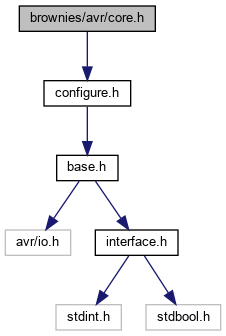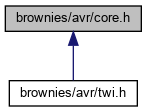|
Home2L - C/C++ API v1.4-2-g83f4c (2025-08-23)
Smart Tools for a Private Home
|
|
Home2L - C/C++ API v1.4-2-g83f4c (2025-08-23)
Smart Tools for a Private Home
|
This file contains core functionality of the Brownie firmware.
Definition in file core.h.
#include "configure.h"

Go to the source code of this file.
Classes | |
| struct | SBrEeprom |
| Structure to describe the complete EEPROM content. More... | |
Functions | |
Timer ... | |
| uint16_t | TimerNow () |
| Get current time in ticks. | |
Interface Functions of the "core" Module ... | |
The feature modules (e.g. gpio.[hc], shades.[hc]) have a common set of interface functions. The following functions are the interface for the pseudo-module "core", which implements some core functionality. If you are developing a feature module: Never call these functions directly. They are only documented here in order to document the general module interface functions. | |
| void | CoreInit () |
| Initialize the module. | |
| static void | CoreIterate () |
| Iterate the module. | |
| void | CoreOnRegRead (uint8_t reg) |
| Update a register when it is read. | |
| void | CoreOnRegWrite (uint8_t reg, uint8_t val) |
| Write a register. | |
Variables | |
Persistent Storage (EEPROM) ... | |
| struct SBrEeprom | brEeprom |
| Complete EEPROM contents. | |
Memory and Registers ... | |
< Helper to declare an empty / deactivated module (see Microcontroller: API). | |
| #define | brConfigRecord ((const TBrConfigRecord) _brConfigRecord) |
| The Brownie config recourd. | |
| #define | RegGet(REG) (_regFile[REG]) |
| Get a register value. | |
| #define | RegSet(REG, VAL) do { _regFile[REG] = (VAL); } while (0) |
| Set a register to a new value. | |
| const __flash TBrFeatureRecord | brFeatureRecord |
| The Brownie feature recourd. | |
Mini-Timer ... | |
8-bit counter with a cycle time of 8µs to be used locally in modules. Presently, the mini-timer is used by the ISRs of the UART and the 'temperature' modules. Minitimers must be used with interrupts disabled. Note: MinitimerReset() and MinitimerNow() are implemented as macros to ensure that they are inlined. Otherwise, ISRs may get a very long prologue saving many registers. This causes problems in 'TemperatureISR()' on the ATtiny861. | |
| #define | MINITICKS_OF_US(X) (X * (BR_CPU_FREQ / 1000000) / 8) |
| Number of 8-bit timer ticks of a microsecond value for a clock selection of clk_io/8. | |
| #define | MINI_CLOCK_SCALE_1 |
| Minitimer clock period of 1/BR_CPU_FREQ. | |
| #define | MINI_CLOCK_SCALE_8 |
| Minitimer clock period of 8 * 1/BR_CPU_FREQ. | |
| #define | MINI_CLOCK_SCALE_64 |
| Minitimer clock period of 64 * 1/BR_CPU_FREQ. | |
| #define | MINI_CLOCK_SCALE_256 |
| Minitimer clock period of 256 * 1/BR_CPU_FREQ. | |
| #define | MINI_CLOCK_SCALE_1024 |
| Minitimer clock period of 1024 * 1/BR_CPU_FREQ. | |
| void | MinitimerStart (int clockScale) |
| Start the minitimer (pass any MINI_CLOCK_SCALE_* constants) | |
| void | MinitimerStop () |
| Stop the minitimer. | |
| void | MinitimerReset () |
| Reset the minitimer. | |
| uint8_t | MinitimerNow () |
| Get the current minitimer value. | |
Change Reporting ... | |
| static void | ReportChange (uint8_t mask) |
| Set (a) bit(s) in the BR_REG_CHANGED register. | |
| void | ReportChangeAndNotify (uint8_t mask) |
| Set (a) bit(s) in the BR_REG_CHANGED register and issue a TWI host notification. | |